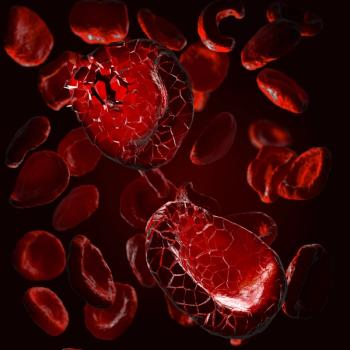
APOBEC mutational activity appears to be prognostic in patients with newly diagnosed multiple myeloma or precursor diseases who receive daratumumab quadruplets, according to Kylee Maclachlan, MBChB, PhD.

Your AI-Trained Oncology Knowledge Connection!


APOBEC mutational activity appears to be prognostic in patients with newly diagnosed multiple myeloma or precursor diseases who receive daratumumab quadruplets, according to Kylee Maclachlan, MBChB, PhD.

When teclistamab was evaluated in a real-world setting, investigators determined that efficacy was similar between that and the phase 2 MajesTec-1 trial for patients with relapsed/refractory multiple myeloma.

Investigators report a low rate of high-grade hematologic adverse effects following treatment with induction Dara-KRd and consolidation double transplant in patients with high-risk, newly diagnosed multiple myeloma.

Many patients with relapsed/refractory multiple myeloma appear to remain on treatment with mezigdomide-based regimens for more than 1 year, according to Albert Oriol, PhD.

Durcabtagene autoleucel shows robust expansion in vivo followed by persistence in approximately half of patients with relapsed/refractory multiple myeloma enrolled on a phase 1 trial.

Talquetamab appears to produce the highest overall response rates vs other types of bispecific antibody monotherapy among patients with relapsed/refractory multiple myeloma in a systematic review.

Investigators report no grade 3 or higher adverse effects in patients with multiple myeloma assigned to undergo strength building or walking as part of a study.

Clearance of an automated immunoassay allows practices to measure chromogranin A concentration in human serum, thereby tracking disease progression in those with gastroenteropancreatic neuroendocrine tumors.

IDE161 is now eligible for inclusion in a development program allowing for expediated regulatory review following its FDA fast track designation status for advanced BRCA1/2-mutant ovarian cancer.

The safety and tolerability of IDE161 is being assessed as part of a phase 1 trial in solid malignancies including breast cancer.

Findings from the phase 2 GMMG-CONCEPT trial suggest that elevated lactate dehydrogenase levels correlated with worse survival in patients with newly diagnosed, high-risk multiple myeloma.

Lucio N. Gordan, MD, reviews how the chemotherapy drug shortages have led to price gouging, potentially making treatment unavailable to patients.

MYTX-011 is being assessed as part of the phase 1 KisMET-01 study in patients with locally advanced, recurrent or metastatic non–small cell lung cancer.

Based on findings from the phase 1/2 BCHILD trial, the FDA approved bosutinib for pediatric chronic myelogenous leukemia.

Artificial intelligence programs may help introduce new care strategies that minimize the risk of adverse effects in patients with prostate cancer, according to Wayne G. Brisbane, MD.

Artificial intelligence may help detect tumors both within the prostate and that have spread to areas outside of the prostate, according to Wayne G. Brisbane, MD.

The conditional marketing approval of epcoritamab in relapsed/refractory diffuse large B-cell lymphoma is based on data from the phase 1/2 EPCORE NHL-1 study.

The FDA has not requested any additional data or clinical trials supporting the supplemental biologics license application for an on-body injector presentation of pegfilgrastim-cbqv.

Investigators of the phase 3 CheckMate-77T trial report positive findings for patients with nonmetastatic non–small cell lung cancer who were treated with neoadjuvant nivolumab and chemotherapy.

Pembrolizumab plus lenvatinib does not improve objective response rate compared with standard-of-care treatment among patients with metastatic non–small cell lung cancer in the phase 3 LEAP-006 and LEAP-008 trials.

Monique Gary, DO, MSc, FACS, discusses emerging data on early-onset cancers, including breast cancer which had the highest incidence in this population.

The agent, which is a recombinant Erwinia asparaginase or crisantaspase, can be given to those with acute lymphoblastic leukemia and lymphoblastic lymphoma intravenously and intramuscularly.

Community health worker–led intervention may yield improvements in patient activation, hospice use, and total health care costs compared with usual care in those with newly diagnosed cancer.

An artificial intelligence algorithm appears to create accurate focal treatment margins in patients with prostate cancer, according to Wayne G. Brisbane, MD.

Findings from the PRO-TECT trial suggest that patients and nurses are generally in favor of implementing financial toxicity screening into routine care for cancer.

Artificial intelligence may be useful in screening for prostate cancer in patients with elevated prostate specific antigen levels who have undergone MRI, according to Wayne G. Brisbane, MD.

Data from the NeoRes II trial caution against routinely delaying surgery for more than 6 weeks after patients with resectable locally advanced esophageal cancer receive neoadjuvant chemoradiotherapy.

Treatment with ibrutinib significantly reduces the risk of initiating next treatment in patients with chronic lymphocytic leukemia or small lymphocytic lymphoma compared with bendamustine/rituximab in a real-world setting.

A health-related quality of life analysis of the phase 3 NATALEE trial supports the risk/benefit profile of adding ribociclib to nonsteroidal aromatase inhibitors in patients with hormone receptor–positive, HER2-negative early breast cancer.

Experts met to debate recently presented trials in the hematologic oncology after the 2023 American Society of Clinical Oncology Annual Meeting.